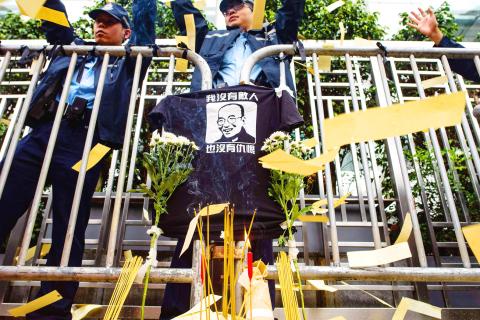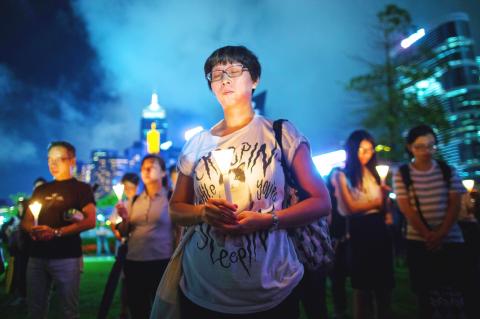Hong Kong activists yesterday tied black ribbons to security fences outside the Chinese government’s office in the territory to mark one year since the death of Nobel Peace Prize-winning dissident Liu Xiaobo (劉曉波).
A veteran of the 1989 Tiananmen Square protests, Liu died from liver cancer while serving an 11-year sentence in China for “subversion.”
Dozens of pro-democracy campaigners gathered outside China’s liaison office in the semi-autonomous territory, ahead of a larger public memorial event later in the evening.

Photo: AFP
The commemorations came three days after Liu’s widow, Liu Xia (劉霞), arrived in Germany after eight years of de facto house arrest in Beijing.
Activists attached a picture of Liu Xiaobo to the wall outside the liaison office, tied black ribbons to metal barriers, burned incense and threw paper money traditionally offered to the dead.
The group also called for the release of prominent Chinese democracy activist Qin Yongmin (秦永敏), who Beijing on Wednesday jailed for 13 years for “subversion of state power.”

Photo: EPA-EFE
They also called for the release of lawyers arrested in the “709 crackdown” of 2015, the largest-ever clampdown on the legal profession in China.
“[The Chinese government] released Liu Xia on Tuesday, then jailed Qin Yongmin on Wednesday,” veteran democracy activist Leung Kwok-hung (梁國雄) said.
“So to release Liu Xia was an act to hoodwink the public and pretend to show mercy,” he told reporters.

Photo: EPA-EFE
Pro-democracy lawmaker Kwok Ka-ki (郭家麒) called for freedom of speech and elections in China, as Liu Xiaobo had advocated.
China’s release of Liu Xia was a bid to woo European allies in the face of a trade war with the US, Kwok said.
Hong Kong Chief Executive Carrie Lam (林鄭月娥) was criticized by democracy campaigners after she described the freeing of Liu Xia as an “act of humanitarianism.”
Hong Kong pro-democracy lawmaker Claudia Mo (毛孟靜) on Thursday grilled Lam over that statement in a heated exchange in the Hong Kong Legislative Council, asking Lam whether she was a “Beijing groveler.”
Meanwhile, Beijing yesterday warned supporters of Liu Xiaobo not to mark the anniversary of his death.
Supporters of the Lius in China said they had been unable to organize any large-scale event to mark the day and some have been “vacationed” by the authorities, a common practice where security agents take prominent dissidents away from cities during sensitive events to keep them quiet.
Hu Jia (胡佳), a Beijing-based dissident who knew Liu Xiaobo, on Sunday told reporters that he was going to be taken to Chongli, four hours outside of Beijing.
“They said I could not go near the sea,” he said.
Liu Xiaobo was given an ocean burial, which prompted activists to flock to their nearest seashore to stage demonstrations.
Three other friends or supporters of Liu Xiaobo who declined to be named told reporters that they had been contacted by the authorities and told not to host memorial events or protests to mark the date.
State security could not be contacted for comment, as they do not have a publicly listed number.
The Chinese Ministry of State Security did not respond to a faxed request for comment.
In Taipei, exiled Chinese dissident Wuer Kaixi yesterday spoke at a ceremony to unveil a sculpture to commemorate Liu Xiaobo.

AIR SUPPORT: The Ministry of National Defense thanked the US for the delivery, adding that it was an indicator of the White House’s commitment to the Taiwan Relations Act Deputy Minister of National Defense Po Horng-huei (柏鴻輝) and Representative to the US Alexander Yui on Friday attended a delivery ceremony for the first of Taiwan’s long-awaited 66 F-16C/D Block 70 jets at a Lockheed Martin Corp factory in Greenville, South Carolina. “We are so proud to be the global home of the F-16 and to support Taiwan’s air defense capabilities,” US Representative William Timmons wrote on X, alongside a photograph of Taiwanese and US officials at the event. The F-16C/D Block 70 jets Taiwan ordered have the same capabilities as aircraft that had been upgraded to F-16Vs. The batch of Lockheed Martin

GRIDLOCK: The National Fire Agency’s Special Search and Rescue team is on standby to travel to the countries to help out with the rescue effort A powerful earthquake rocked Myanmar and neighboring Thailand yesterday, killing at least three people in Bangkok and burying dozens when a high-rise building under construction collapsed. Footage shared on social media from Myanmar’s second-largest city showed widespread destruction, raising fears that many were trapped under the rubble or killed. The magnitude 7.7 earthquake, with an epicenter near Mandalay in Myanmar, struck at midday and was followed by a strong magnitude 6.4 aftershock. The extent of death, injury and destruction — especially in Myanmar, which is embroiled in a civil war and where information is tightly controlled at the best of times —

China's military today said it began joint army, navy and rocket force exercises around Taiwan to "serve as a stern warning and powerful deterrent against Taiwanese independence," calling President William Lai (賴清德) a "parasite." The exercises come after Lai called Beijing a "foreign hostile force" last month. More than 10 Chinese military ships approached close to Taiwan's 24 nautical mile (44.4km) contiguous zone this morning and Taiwan sent its own warships to respond, two senior Taiwanese officials said. Taiwan has not yet detected any live fire by the Chinese military so far, one of the officials said. The drills took place after US Secretary

THUGGISH BEHAVIOR: Encouraging people to report independence supporters is another intimidation tactic that threatens cross-strait peace, the state department said China setting up an online system for reporting “Taiwanese independence” advocates is an “irresponsible and reprehensible” act, a US government spokesperson said on Friday. “China’s call for private individuals to report on alleged ‘persecution or suppression’ by supposed ‘Taiwan independence henchmen and accomplices’ is irresponsible and reprehensible,” an unnamed US Department of State spokesperson told the Central News Agency in an e-mail. The move is part of Beijing’s “intimidation campaign” against Taiwan and its supporters, and is “threatening free speech around the world, destabilizing the Indo-Pacific region, and deliberately eroding the cross-strait status quo,” the spokesperson said. The Chinese Communist Party’s “threats